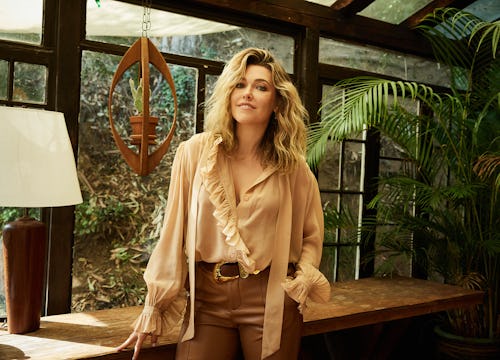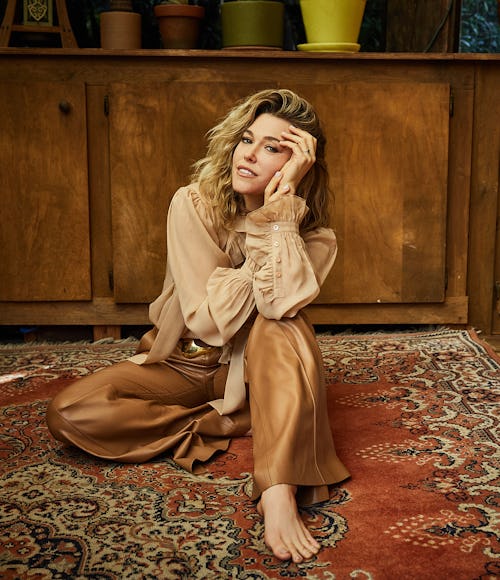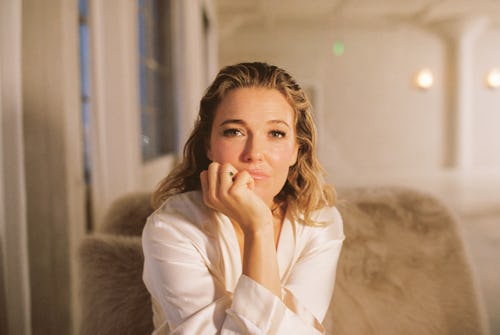
In late 2021, Rachel Platten was having the kind of nightmare day every parent fears. Her younger daughter, Sophie, then just a few months old, was in the hospital with a 105-degree fever, and Platten can still recall the concerned looks on doctors’ faces as she was shuffled from room to room, pleading for answers about what was happening.
It was enough to unravel any parent, and Platten was already dealing with a lot. The singer-songwriter, who is also mom to 5-year-old Violet, struggled with postpartum depression and anxiety after both her pregnancies. At times, she experienced panic attacks in which it felt like she was disconnecting from her body. To reground herself, Platten would retreat to the piano in the backyard studio of her Los Angeles home and busy herself at the piano. “It was a way of putting myself back on earth,” she says. “When you’re dissociating, you’re floating.”
When she got home from the hospital that night, Platten, now 43, ran into her studio space “needing to cry and hit pillows and punch things and lose my mind,” she says. Instead, she sat down and, within about 20 minutes, had written the bones of “Mercy,” a swirling, southern-R&B stormer about begging the universe for a break when you can’t take one more curveball. “That song came through me,” Platten says, “almost as medicine to alleviate the pain.”
Most of Platten’s new album, which will be released on Aug. 30, spilled out like this, often before she could fully grasp what the songs contained. Platten thought she wrote “Bad Thoughts” — a raw reflection on anxiety that incorporates breathing exercises — for other moms after her first pregnancy, then found herself desperately reaching for it after her second. “These songs came to me so easily, more easily than they ever did after becoming a mom, and I think that’s because I needed them so badly,” says Platten. “I asked very intentionally before the record: May I finally write what I need this time. Not what I think the world needs from me. Not what the ‘Fight Song’ girl should do next. What do I need?”
“It was scary to hear that my friends and family were noticing I was struggling. I was like, ‘Don’t also tell me I’m f*cked up. I think that. I need you to think I’m OK.’”
Platten tells me this over an early lunch in Tribeca, not far from where she used to live before “Fight Song” — the undeniably catchy, sometimes polarizing anthem that turns 10 this month — took her from New York City dive bars to unexpected pop stardom at age 33. The song introduced her to millions and became a lifeline for listeners of all ages enduring hard times; today, in her Instagram comments, it is still common to see followers confessing how it helped them through cancer or depression or loss. But the song’s ubiquity — and its association with Hillary Clinton’s 2016 presidential campaign (more on that later) — also tied it, perhaps unfairly, to an era whose mood of relentless optimism would come to feel cringe in later years.

Platten, though, never got jaded, according to country star Kelsea Ballerini, who met the singer backstage at a Taylor Swift concert during the height of “Fight Song.” “I immediately was drawn to how open she was to friendship, comradery, and community,” Ballerini says. “I love excitable people who keep the stars in their eyes even when things are working in a big way. Over the last eight years of knowing her, through her having babies and so much happening, she is still so open and kind and has an eagerness to do good and be a good person. I just don’t think there are a lot of people like that.”
When I meet Platten at the restaurant, she moves us over to a cozier corner table nearby and asks the waiter for a candle. “I know that’s ridiculous,” she says — it wasn’t even noon yet — “but I like to beautify everything.” She’s in town for a small showcase to preview the new album, which she recorded in Nashville and will release through her own independent label, Violet Records; her husband, Kevin Lazan, who used to work in consulting, is its general manager. The stakes are more personal now, and as we get settled, Platten admits to battling some insecurity. “I feel like I need to prove people wrong about what they assume about me, because I don’t feel like this album is similar to what I’ve done,” she explains. “I almost want to shout from the rooftops: Don’t write it off!”
Platten has a mantra of sorts ready for moments like this: “When I ask for more, that is my ego asking. It’s asking for ego snacks when I already got the soul food.” Still, she accepts that part of her will always want the industry’s approval. The album’s first single, “Girls,” has all the makings of a “Let It Go”-esque anthem, and Platten laughs about how she’s been setting the song to scenes from Frozen on her TikTok to try to get on the House of Mouse’s radar. (“I would love to voice a Disney princess,” she says.) “Girls,” in a way, takes the opposite approach of “Fight Song”: It’s a sweet but honest what-I’ve-learned letter to her daughters that doesn’t sugarcoat the hard stuff. “I think this album feels so good because you feel like you had the whole meal,” Platten says. “You didn’t just have the dessert that feels good.”
It’s a pop album profoundly shaped by parenthood and all the ways it expands your heart in directions both joyous and painful. At one point, I ask Platten about what her family life looks like outside of music, expecting her to share a sweetly bland detail, like her family’s Sunday night pizza dinners, but I get a different answer instead. “It’s hard and I’m tired and it’s a lot and it’s overwhelming and it’s also fun and beautiful and chaotic,” she says without any hesitation. “It’s all the things.”

By her late 20s, Platten thought she had figured out a life in music. She was gigging all over New York, doing small tours, and singing commercials to supplement her income. Maybe it wasn’t always glamorous, she thought, but it was enough. Until 2011, when she met her former manager, Ben Singer, who gave her some career advice that resonated: “‘You’ve been trying to warm yourself on everybody else’s fire. Go build your own fire, and people will come.’”
Platten moved to Los Angeles and spent the next few years dutifully grinding it out in the studio. Hundreds of songs later, though, she started to wonder why she didn’t have more to show for it. “My publisher called me and told me, ‘Rachel, you’re writing all these songs, but you’re not telling your story,’” she says. “I was frustrated because I felt like I had told my story so many ways.” She channeled all those feelings into another song. “It was like a little rebellion: ‘I’m not going to give up on myself — I don’t care if anyone else believes in me.’”
“I did not want to be the torchbearer of empowerment or vulnerability or truth or earnestness.”
When Platten finally released “Fight Song” in June of 2014, it was… crickets. She laughs about it now, but it stung at the time. She remembers “throwing a little tantrum” one evening, shouting and crying about how nothing was moving the needle. But when she woke up the next morning, Platten felt strangely calm. She knew the song could touch the lives of people who heard it — why did she need numbers or chart positions to prove it? “What I think really ignited [the song] was my final surrender of the dream,” she says, “because 10 days after that, it exploded.”
It went like this: In January of 2015, a radio programmer in Baltimore discovered “Fight Song” and played it over and over as part of the station’s breast cancer fundraising marathon, creating a grassroots buzz. In February, after years of failing to get labels’ attention, Platten signed with Columbia Records as the song was creeping up the charts. In June, she was on stage with Taylor Swift at the 1989 World Tour, singing “Fight Song” as one of the tour’s surprise guests. (As if Swift’s endorsement wasn’t loud enough, Swift was photographed having lunch with Selena Gomez wearing a shirt that said “This Is My Fight Song.”)
And then there was the Hillary of it all. “Fight Song” already felt to Platten “like a ride I couldn’t hold on to” by the time the Clinton campaign began playing it at events, including the 2016 Democratic National Convention, which featured the song in a star-studded, Pitch Perfect-themed video. “It became attached to a political party sorta against my will,” Platten says. “I gave approval, but only after months and months of saying no.”
She had said yes because of the historic importance of the Clinton campaign: This could be our first woman president! Think of the inauguration! But Platten’s life felt so out of control, she didn’t feel equipped or informed enough to be a kind of spokesperson. (“I’m still scared to say too much and be criticized,” she says. “It’s so funny because I’m 43 — at this point in my life, shouldn’t I feel freedom?”) And she felt in her gut that the context didn’t suit the song. “It has to have a realness to the depths of what you are fighting for. It has to not be some bullsh*t statement of trying to win people over,” she says. “When it becomes this mass statement, it’s cheesy.”
“It wasn’t birth [that caused problems]. Birth just triggered something that needed to come out.”
Under such a glaring spotlight, the song became a punching bag on both ends of the political spectrum. “I did feel misunderstood, and I did feel sad for the song in a way,” she says. “I almost felt like: How dare you? There’s a little girl in a hospital saying this song is giving her hope, and you’re making fun of it?” Platten looks back at her last album, 2017’s Waves, and thinks its moody palette was an attempt to run away from the song. “I did not want to be the torchbearer of empowerment or vulnerability or truth or earnestness anymore,” she says.
But these days, what keeps the song in her life, what helps her hear it like new, is children — kids love “Fight Song.” Her friends’ children will sing it at talent shows or recitals, and Violet’s classmates are starting to figure out who she is. The song also had a huge moment in the FX show Fleishman Is in Trouble in 2022 because the child actors started singing it impromptu.
Platten has some ideas about why it connects with kids. “Everyone’s always telling you as a kid to be quiet, stop fighting, stop asserting yourself or being aggressive — all our gentle-parenting BS. It must feel really fun to just scream at the top of your lungs. I know it is for me onstage.” Plus, she says, “I don’t want to discount that maybe there’s something in the song that gives [kids] that reignition of belief and courage they need in that moment, even if those problems don’t seem as big.”

When “Fight Song” was blowing up, Platten thought age would inoculate her from all the ways sudden success can upend your life. “I kept saying, ‘This would have been f*cked up if I was younger, thank God I know who I am already,” Platten remembers. “But it really took me for a ride. By the time I had my first daughter, there was some latent stuff I hadn’t looked at.”
Platten gave birth to Violet in 2019 and was back on the road three months later. “It was this little battle: ‘I will not lose my former self!’” Platten says. “‘I will throw her on my back, breastfeed after a show to 15,000 people, and I’m gonna be just fine.’” She had a hard time acknowledging her struggles, “which is ironic,” Platten says now, because she grew up with a therapist mother and psychologist father; his idea of a bedtime story was teaching her about Freud. “I was so steeped in that language [of mental health], I felt like: ‘I would know if I was depressed,’” Platten explains. Living in Los Angeles didn’t help either. “A lot of the danger of the LA spiritual scene is this tendency to bypass the dark and push it away and not look at it,” she says. “I did a fair bit of that.”
“Real strength is acknowledging that I’m human, these waves are going to come, and I cannot fight them.”
The pandemic, for all the terrifying uncertainties it brought parents, offered a reset. “It was healing for me and Violet to make our world very small after our world got so big too soon,” she says. But within days of giving birth to Sophie in 2021, Platten’s loved ones could tell something was wrong. She wasn’t sleeping and barely left her room. “It was scary for me to hear that my friends and family were noticing I was struggling,” she says. “I was like, ‘Don’t also tell me I’m f*cked up. I think that. I need you to think I’m OK.’”
When Platten’s therapist suggested she consider an antidepressant, Platten bristled. Her entire sense of self was built around the idea that there wasn’t a problem on earth she couldn’t solve by trying harder. “It was so shocking to feel lost and not be able to wish it away or pray it away or reiki it away or meditate it away,” she says. So many things can feel like medicine; sometimes you need medicine medicine. “I’m just so grateful that it exists,” she adds.

Antidepressants didn't solve everything, of course. At the show a few days after our lunch, Platten was in the middle of performing a new song from the album when she folded over at her side, wincing in pain. “It’s another thing I've been facing this year — some chronic pain — but I’m OK,” she tells the audience between anguished breaths. She apologizes repeatedly, though the crowd was already giving her a standing ovation.
When I follow up with Platten a few months later in May, she happily reports that she is pain-free. She theorizes that the physical pain — just like her anxiety and panic attacks and other symptoms — were all manifestations of being stuck in fight-or-flight mode for so long. “I have since done so much work and learned how to allow all of that buried emotion to come up and show my body that it is safe,” she says. “It wasn’t birth [that caused problems], birth just triggered something that needed to come out.”
“Even when I look back at the ‘Fight Song’ girl,” Platten continues, “I was so afraid to be perceived as anything other than lovely and sweet and kind and happy and grateful, when the truth is, there was so much more beneath the surface. There was terror and jealousy and fear and hunger and competition and grief — just what a human experience is. The most beautiful part about where I am now is I've integrated it all.”
Real strength, she knows now, isn’t about barreling through. “It’s acknowledging that I’m human, these waves are going to come, and I cannot fight them,” she says. When I saw Platten perform “Mercy” at that same show earlier this year, she transformed one of the worst days of her life into something electric for the audience. She smiled and pumped her fist in the air to lead us in a singalong. Later, she threw her head back, eyes shut, and rocked her body to the rhythm she was pounding out on the piano. There was grief in her lyrics, but a real feeling of joy in the room. To borrow her words: It was overwhelming and it was fun, it was beautiful and it was chaotic — it was all the things.
0 comments:
Post a Comment